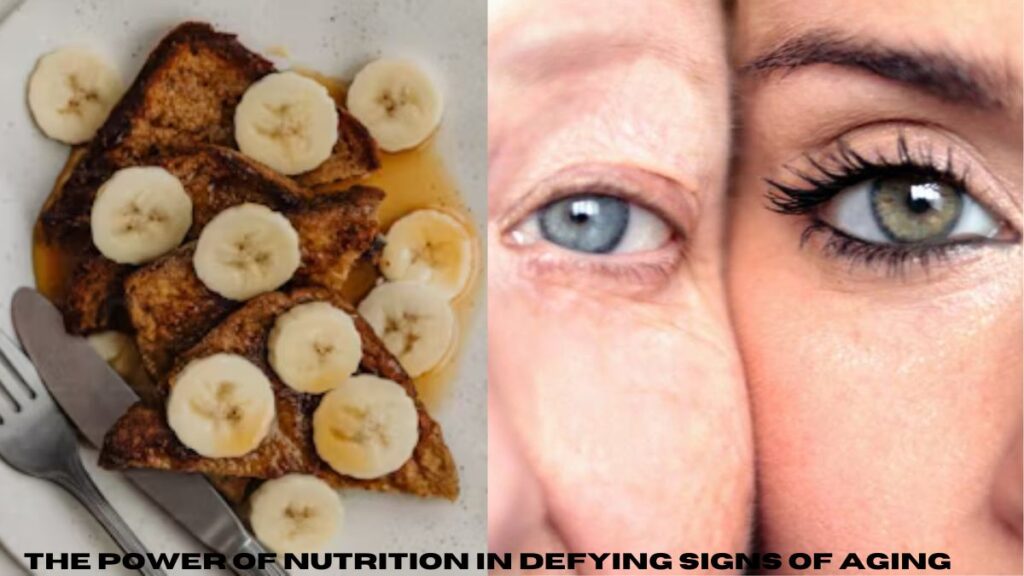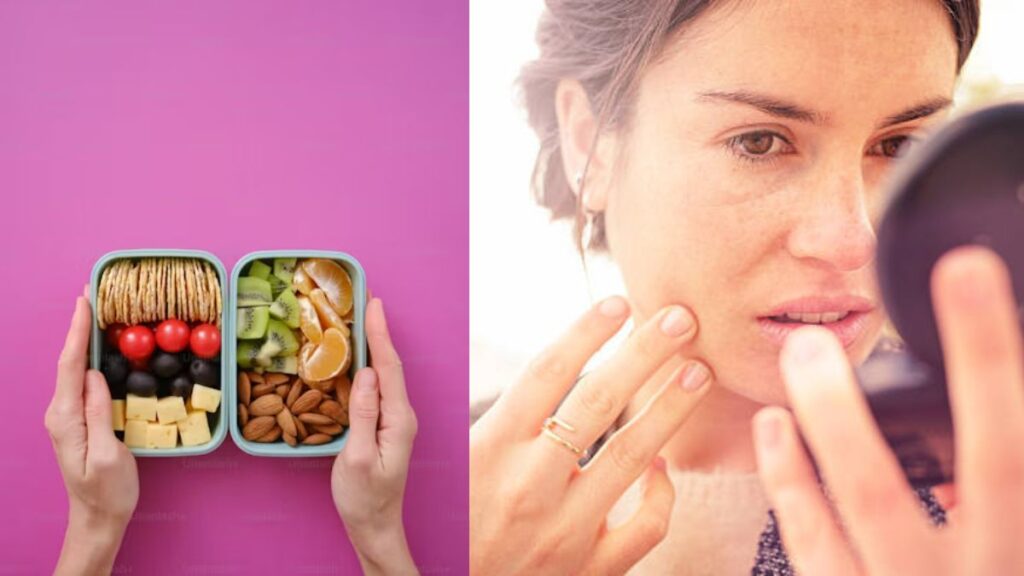Introduction:
Aging Backwards: The Power of Nutrition in Defying Signs of Aging

In a society obsessed with youthfulness and beauty, the quest to defy the signs of aging has become a multi-billion-dollar industry. From skincare products to cosmetic procedures, people are constantly seeking ways to turn back the clock. However, one of the most powerful tools in the fight against aging lies not in a bottle or a syringe but on our plates: nutrition. The foods we eat can have a profound impact on our overall health and appearance, influencing everything from our skin elasticity to our cognitive function. In this article, we’ll explore the role of nutrition in defying the signs of aging and how making smart dietary choices can help us age backwards.
The Science Behind Aging: Before delving into the power of nutrition, it’s essential to understand the science behind aging. Aging is a complex process influenced by various factors, including genetics, lifestyle, and environmental exposures. At the cellular level, aging is characterized by a gradual decline in cellular function and an accumulation of damage over time. This damage can manifest as wrinkles, sagging skin, cognitive decline, and an increased risk of chronic diseases such as heart disease, diabetes, and cancer.
The Power of Nutrition in Defying Signs of Aging
Nutrition plays a critical role in modulating the aging process by providing essential nutrients that support cellular function, repair DNA damage, and reduce inflammation. Certain nutrients have been identified for their potent anti-aging properties, including antioxidants, omega-3 fatty acids, vitamins, and minerals. Antioxidants, found in abundance in fruits, vegetables, and other plant-based foods, help neutralize harmful free radicals that contribute to cellular damage and aging. Omega-3 fatty acids, found in fatty fish, flaxseeds, and walnuts, have anti-inflammatory effects that can help protect against age-related diseases and maintain brain health.
The Anti-Aging Diet: Building an anti-aging diet begins with emphasizing nutrient-dense foods that provide a wide range of vitamins, minerals, and phytonutrients. Leafy greens, berries, nuts, seeds, fatty fish, and colorful fruits and vegetables should form the foundation of a healthy anti-aging diet. These foods are rich in antioxidants, fiber, and healthy fats that support skin health, cognitive function, and overall well-being. Additionally, it’s essential to limit or avoid processed foods, sugary snacks, and refined carbohydrates, which can promote inflammation and accelerate the aging process.
Nutrition for Skin Health: The skin is often the first place where signs of aging become apparent, with wrinkles, fine lines, and age spots serving as visible reminders of the passage of time. While skincare products can help improve the appearance of the skin externally, true skin health begins from within. Nutrients like vitamin C, vitamin E, zinc, and collagen-boosting peptides play key roles in maintaining skin elasticity, hydration, and resilience. Incorporating foods rich in these nutrients, such as citrus fruits, almonds, pumpkin seeds, and bone broth, can help support youthful-looking skin from the inside out.
Lifestyle Factors: In addition to nutrition, lifestyle factors such as exercise, stress management, and adequate sleep play integral roles in defying the signs of aging. Regular physical activity helps maintain muscle mass, bone density, and cardiovascular health, while also reducing stress and promoting mental well-being. Managing stress through mindfulness practices like meditation and yoga can help reduce cortisol levels and prevent premature aging. Furthermore, prioritizing quality sleep is essential for cellular repair and regeneration, allowing the body to recover and rejuvenate each night.
What role does nutrition play in combating the signs of aging
Nutrition plays a crucial role in combating the signs of aging by providing essential nutrients that support overall health, cellular function, and skin integrity. As we age, our bodies undergo physiological changes that can impact various systems and contribute to the development of age-related conditions. However, a well-balanced diet can help prevent or mitigate these changes and promote vitality and longevity. Here are some key ways nutrition influences the aging process:

- Antioxidants: Antioxidants are compounds found in many fruits, vegetables, nuts, and seeds that help neutralize harmful free radicals in the body. Free radicals are unstable molecules that can damage cells and contribute to aging processes such as inflammation, oxidative stress, and DNA damage. By scavenging free radicals, antioxidants help protect cells from damage and support overall health and vitality.
- Anti-Inflammatory Foods: Chronic inflammation is believed to play a significant role in the aging process and the development of age-related diseases such as heart disease, diabetes, and Alzheimer’s disease. Consuming a diet rich in anti-inflammatory foods, such as fatty fish, olive oil, leafy greens, and berries, can help reduce inflammation in the body and mitigate the risk of chronic diseases associated with aging.
- Healthy Fats: Omega-3 fatty acids, found in fatty fish, flaxseeds, chia seeds, and walnuts, have anti-inflammatory properties and are essential for brain health, cardiovascular function, and skin integrity. Consuming adequate amounts of healthy fats can help maintain cognitive function, support heart health, and keep the skin supple and hydrated.
- Protein: Protein is essential for maintaining muscle mass, bone density, and overall strength, which can decline with age. Adequate protein intake is particularly important for older adults to support muscle repair and growth, prevent muscle loss (sarcopenia), and promote healthy aging.
- Vitamins and Minerals: Micronutrients such as vitamins and minerals play various roles in the body, including supporting immune function, bone health, energy metabolism, and collagen production. Key vitamins and minerals for anti-aging include vitamin C, vitamin E, vitamin D, vitamin K, calcium, magnesium, and zinc. Consuming a diverse range of nutrient-rich foods can help ensure adequate intake of these essential nutrients.
- Hydration: Adequate hydration is essential for maintaining skin moisture and elasticity, regulating body temperature, flushing toxins from the body, and supporting cellular function. Dehydration can exacerbate the visible signs of aging, such as dry skin, fine lines, and wrinkles. Drinking plenty of water and consuming hydrating foods like fruits, vegetables, and soups can help keep the skin hydrated and youthful-looking.
- Whole Foods vs. Processed Foods: Choosing whole, minimally processed foods over highly processed and sugary foods can provide a more comprehensive array of nutrients while reducing the intake of additives, preservatives, and empty calories. Whole foods are typically richer in vitamins, minerals, fiber, and antioxidants, which are essential for healthy aging.
- Caloric Intake and Weight Management: Overeating and obesity are risk factors for several age-related diseases, including diabetes, cardiovascular disease, and certain cancers. Maintaining a healthy weight through balanced nutrition and regular physical activity can help reduce the risk of these conditions and promote longevity.
Can you discuss the importance of skincare routines in an anti-aging regimen?
Skincare routines play a crucial role in an anti-aging regimen, as they can help address and prevent the visible signs of aging, such as wrinkles, fine lines, age spots, and loss of elasticity. Here’s why skincare routines are essential for combating aging:
- Prevention of Damage: A consistent skincare routine can help prevent damage to the skin caused by environmental factors such as UV radiation, pollution, and free radicals. Protective measures like sunscreen and antioxidants can shield the skin from harmful UV rays and oxidative stress, which can accelerate the aging process and lead to premature wrinkles and discoloration.
- Stimulation of Collagen Production: Collagen is a protein that provides structural support to the skin, helping it appear firm, plump, and youthful. As we age, collagen production naturally declines, leading to sagging and wrinkles. Skincare products containing ingredients like retinoids, peptides, and growth factors can stimulate collagen synthesis, improving skin texture and reducing the appearance of fine lines and wrinkles.
- Hydration and Moisture Retention: Adequate hydration is essential for maintaining skin health and elasticity. A skincare routine that includes moisturizers and hydrating serums can replenish the skin’s moisture barrier, preventing dryness and reducing the appearance of wrinkles and fine lines. Ingredients like hyaluronic acid and glycerin attract and retain moisture in the skin, keeping it plump and supple.
- Exfoliation and Cell Renewal: Exfoliation is the process of removing dead skin cells from the surface of the skin, allowing for better absorption of skincare products and promoting cell turnover. Regular exfoliation with gentle chemical or physical exfoliants can help smooth the skin’s texture, improve tone, and reduce the appearance of age spots and uneven pigmentation.
- Targeted Treatments: Skincare routines can include targeted treatments for specific aging concerns, such as dark circles, puffiness, and loss of firmness. Ingredients like vitamin C, niacinamide, and caffeine can help brighten the under-eye area, reduce inflammation, and improve skin tone and texture.
- Sun Protection: Sun exposure is one of the primary causes of skin aging, leading to wrinkles, sunspots, and skin cancer. Incorporating a broad-spectrum sunscreen into your skincare routine is essential for protecting the skin from harmful UV rays and preventing photoaging. Sunscreen should be applied daily, even on cloudy days, and reapplied every two hours when exposed to direct sunlight.
- Consistency and Long-Term Results: Consistency is key when it comes to skincare routines and anti-aging regimens. While some skincare products may deliver immediate results, the most significant benefits are often seen with long-term use. Establishing a daily skincare routine and sticking to it can help maintain the health and appearance of your skin over time, leading to lasting anti-aging effects.
Conclusion:
In the quest to defy the signs of aging, the power of nutrition cannot be overstated. By nourishing our bodies with nutrient-rich foods and adopting healthy lifestyle habits, we can support cellular health, reduce inflammation, and promote vitality from the inside out. Aging backwards isn’t about turning back the clock but rather embracing the aging process with grace and vitality. With the right combination of nutrition, exercise, and self-care, we can age gracefully and enjoy a vibrant, healthy life at any age.
Frequently Asked Questions (FAQs)
Q1: How does nutrition affect aging?
A1: Nutrition plays a crucial role in aging as it directly impacts cellular processes, inflammation, oxidative stress, and DNA damage, all of which contribute to the aging process. A balanced diet rich in antioxidants, vitamins, minerals, and healthy fats can help combat these effects and promote cellular repair and regeneration.
Q2: What are some key nutrients for defying signs of aging?
A2: Key nutrients include antioxidants like vitamin C, vitamin E, and beta-carotene, which combat oxidative stress and free radicals. Omega-3 fatty acids found in fish and nuts help maintain skin elasticity and reduce inflammation. Additionally, minerals like zinc and selenium support collagen production and repair DNA damage.
Q3: Can specific foods slow down the aging process?
A3: Yes, certain foods are known for their anti-aging properties. Berries, leafy greens, fatty fish, nuts, seeds, and colorful vegetables are rich in antioxidants and essential nutrients that help protect cells from damage and promote longevity.
Q4: How does hydration affect aging?
A4: Adequate hydration is essential for healthy skin, joint function, and cellular processes. Water helps flush out toxins, maintain skin elasticity, and transport nutrients to cells. Dehydration can accelerate signs of aging such as dry skin, wrinkles, and reduced cognitive function.
Q5: Is there a specific diet recommended for anti-aging?
A5: While there’s no one-size-fits-all diet for anti-aging, following a Mediterranean-style diet rich in fruits, vegetables, whole grains, lean proteins, and healthy fats has been associated with longevity and reduced risk of age-related diseases.
References:
- López-Otín, Carlos, et al. “The hallmarks of aging.” Cell 153.6 (2013): 1194-1217.
- Fenech, Michael. “Micronutrients and genomic stability: a new paradigm for recommended dietary allowances (RDAs).” Food and Chemical Toxicology 40.8 (2002): 1113-1117.
- Grosso, Giuseppe, et al. “Omega-3 fatty acids and depression: scientific evidence and biological mechanisms.” Oxidative medicine and cellular longevity 2014 (2014).
- Ribaya-Mercado, Judy D., and Robert M. Russell. “Sahelian philosophy on antioxidants and aging: Dietary variety for antioxidant defenses.” Mechanisms of ageing and development 111.2-3 (1999): 157-163.
- Estruch, Ramón, et al. “Primary prevention of cardiovascular disease with a Mediterranean diet supplemented with extra-virgin olive oil or nuts.” New England Journal of Medicine 378.25 (2018): e34.






